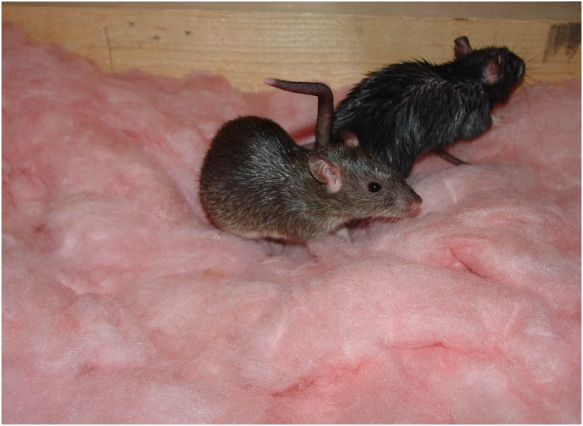One of the reasons to have professional wildlife removal in Kitchener is to protect your pets from catching diseases from wild animals that have adapted to live near humans, such as rodents. Rabies is one of the scariest of these diseases because it is almost always fatal if allowed to incubate and produce symptoms. Is it possible for a dog or cat to catch rabies from a mouse? Also, what other diseases do you have to worry about?
How Does Rabies Spread?
Rabies can spread when the saliva of an infected animal gets into the bloodstream of an uninfected animal. This exchange happens most often by biting, but should the saliva of an infected animal get into the mucus membranes of your pet’s nose or eyes, rabies could potentially spread that way.
Another way that rabies can spread is if an uninfected animal eats the brain of an infected animal. Since mice are so much smaller than dogs and cats, it is at least possible that the larger creature could eat a mouse’s brain.
Can Mice Get Rabies?
Theoretically, it is possible for mice to contract the rabies virus and become sickened by it. However, rabies in mice is very rare. The only way that mice ever become infected with rabies is under controlled circumstances in a lab.
Scientists have offered a couple of explanations for why mice don’t get rabies. One is that mice living in urban settings are largely protected from wild predators that might carry the disease. Another theory is that if a large predator infected with rabies bites a mouse, it usually either kills it instantly or delivers an injury so severe that the mouse dies soon afterward. In either case, the mouse does not live long enough to develop rabies, which takes up to three weeks to incubate.
What Other Diseases Can Pets Get From Mice?
While it is unlikely that a dog or cat will contract rabies from a mouse, that doesn’t mean that mice are safe for them to chase and kill. Mice can spread other potentially dangerous diseases to your pet.
Rat-bite fever is a bacterial infection that can spread when rodents bite pets or when pets eat rodents. Infected pets may be asymptomatic, but the bacteria can cause flu-like symptoms and complications of brain, heart, or lung damage. If your pet has rat-bite fever, it could spread to you or members of your family.
Leptospirosis is another disease that pets can get from rodents. This condition attacks the urinary system of cats and dogs. Pets may contract it directly from contact with rodents or indirectly through exposure to their excrement. Leptospirosis is treatable, but treatment may be costly.
What Can You Do To Protect Your Pet From Rabies and Other Diseases?
The best way to keep your pets safe from diseases from rodents is to keep their vaccinations up to date. Dogs and cats can be vaccinated against rabies and many other diseases. These vaccines are highly effective, and it is generally safer and cheaper to prevent diseases than treat them later.
You can also protect your pet from diseases by making your home unattractive to rodents. Seal off openings in your home’s exterior that could serve as entry points, remove food sources from outside, and clean up crumbs and spilled pet food as soon as possible. Store food, including pet food, in sturdy, airtight containers.
Don’t rely on pets to scare rodents from your property. Rodents outnumber your pets and could expose them to diseases. Instead, contact Skedaddle to have rodents removed thoroughly and humanely from your home. Our process involves sealing entry points so you don’t have to worry about rodents bothering you or your pets anymore.



